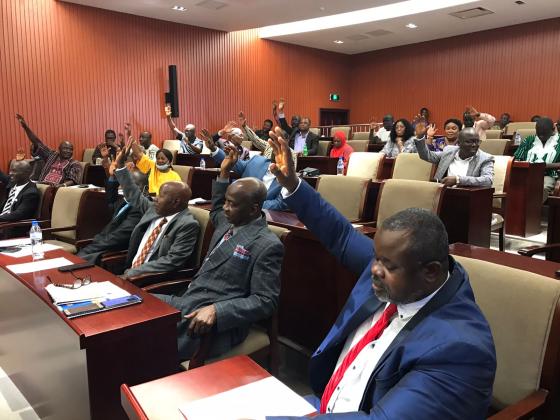Liberia: Another Investment Tax Break?

Members of the House of Representatives voting for the MANCO deal.
Members of the House of Representatives have granted a 15-year tax break to a company, which is expected to construct, develop and operate a vegetable oil refinery in the country.
The tax break, in favor of Mano Manufacturing Company (MANCO), would further narrow the country’s tax base, which has been continuously eroded by multiple tax concessions (exemptions, reduced rates, and incentives) and put the burden on ordinary taxpayers who would have to cover for the foregone revenue.
Currently, many large-scale investments ranging from foreign direct investment to local benefit from numerous and different kinds of tax breaks granted by the legislature against the promise of creating jobs and other aspects of 'economic development.
However, this tax exemption, which has swelled in the last two decades has impacted the country’s budget growth negatively in the form of foregone revenues — making the country more heavily dependable on external grants to fund almost all of its development projects, as well as revenue in the form of budget support.
According to the ratified agreement, GST and Excise Tax on the company will kick in from the seventh and twelfth years of the agreement at the rate of 50% — collected on capital equipment, spare parts, raw materials, and consumables. MANCO's overall investment is valued at US$25 million and is expected to create an undisclosed amount of jobs for Liberians, particularly in the project area of Grand Cape Mount County.
And if the agreement is ratified by the Senate, MANCO would be the latest company to be granted a tax break by the legislature in the absence of cost-benefit analysis focused on their economic and revenue impact.
According to a 2019 report from the World Bank, Liberia should, among other things, establish a process to assess the fiscal implication of tax concessions and that such a report on tax expenditure should be made public.
The report, Liberia Domestic Revenue Mobilization Policy, notes that while tax concessions are a universal feature of tax codes around the globe, the extremely narrow tax base in Liberia as well as lack of scrutiny on granting incentives and the fiscal implications calls for changes in the approach to tax concessions.
It added that the ability to deliver economic or social support to groups or types of taxpayers by allowing exemptions, deductions, and tax credits, generate real costs in form of foregone revenues, and operate without the need for a large infrastructure to deliver the targeted support and thus can be subject to less scrutiny than direct spending programs.
The legislature, despite its love for the tax break, as a means of targeting new industries and mobile investments, the impacts of such love is yet to be felt as the country remains poor, underdeveloped, and with the vast majority of its citizens unemployed, despite the presence of international companies that have benefited and continue to do from their tax breaks.
One risk factor with tax breaks, according to a 2018 study by, the United National Department of Economic and Social Affairs Financing entails significant costs, such as revenue loss, low economic efficiency, increased administrative and compliance costs, and excessive tax planning and tax evasion, which may exceed their benefits and considerably erode the general tax base; and in some cases, few new investments, with a significant cost to the government.
The House's ratification of the MANCO agreement comes after the Joint Committee on Investment and Judiciary said that the agreement was good for the country, without analysis as to whether the economic benefits of the additional investment attracted outweigh the revenue loss from those who would have invested without the special treatment.
MANCO, as part of its social corporate responsibility, is expected to provide free primary and secondary education, free health centers, housing units, rehabilitate the roads, and among others, according to the agreement ratified by the House. The company was founded in the 1960s as Liberia Bleach & Chemicals Company in 1969 and began producing CLORA™ Super Bleach. The company was renamed in 1981 and began adding other products to its roster, including the Mano Palm Oil Industries Limited (MPOI).
MANCO is Liberia's largest manufacturer of household health and cleaning products and is owned by the Fadel Lebanese family.
Meanwhile, the House of Representatives also ratified the amended and restated concession agreement between the government and the Mano Palm Oil Industries Limited (MPOI). MPOI acquired the plantation from Sime Darby in 2019 and the government approved the transfer of interest but sought an additional amendment, which was ratified by the House.
Before Sime Darby, exited from Liberia, the company signed a 63-year concession in 2009 for the 220,000 hectares in northwestern Liberia, with fabulous tax breaks. But in the space of a few years, the company was sold to MANCO on grounds that it was facing tighter environmental rules and resistance to its expansion from environmental groups, who pushed for “no deforestation” rules.
However, the House's Joint Committee on Concession and Judiciary recommended that MPOI should improve the living conditions of the employees by constructing new housing units in four camps, namely: Married Camp, Factory Camp, New Camp, and Dependent Camp. The Committee recommended that the minimum wage of the employees should be increased in accordance with economic status.
